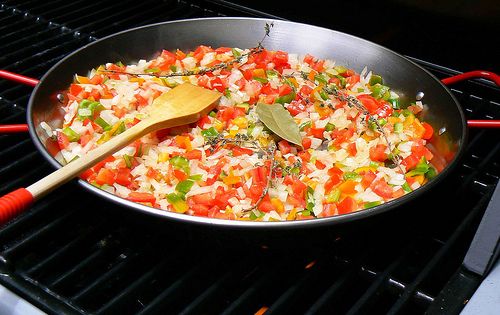Health
So Simple, So Tasty, So Healthy: Sofrito
A quick and easy way to boost heart health and cut cancer risk
Posted January 7, 2014

As readers of Zest for Life know, rare is the recipe of mine that doesn’t start with a chopped onion sautéed in olive oil with some minced garlic. Once the onion is translucent I’ll add tomatoes, thyme and bay leaf, cook it another 15 minutes and there you have it: Spanish sofrito.
If, instead of tomatoes, you add finely chopped carrots and celery, you get soffritto (spelled with two f’s and two t's), Italy’s answer to sofrito. In France this mixture—often cooked in butter, rather than olive oil—is called mirepoix, and it forms the backbone of all stews, soups, stocks and sauces. As you can see, sof(f)rit(t)o is as Mediterranean as it gets!
I have been using sofrito as my culinary starting point for as long as I can remember, partly because my mother and grandmother did so, and partly because I know that this mixture, lightly salted and patiently stirred over medium heat until fragrant and al dente, imparts marvelous flavors to dishes in the way that stock cubes, salt and pepper just can’t.
I didn’t realize, however, that sof(f)rito also has proven medicinal benefits. That is, until I read about a new study into the health-giving properties of this humble but tasty concoction.
In a study (1) published in the journal Food Chemistry, researchers at the University of Barcelona and the CIBERobn network in Spain identified at least 40 different polyphenols and carotenoids—compounds with antioxidant and anti-inflammatory properties—in sofrito by using a high-resolution mass spectrometry technique.
They found that the combination of tomato, olive oil, garlic and onion in sofrito increases the amount of bioactive compounds that help lower the risk of cardiovascular disease and cancer. The bioactive compounds they found in sofrito included polyphenols, carotenoids and vitamin C. Various studies have shown that the intake of carotenoids such as lycopene lowers the risk of prostate cancer, and the consumption of foods rich in beta-carotene may help reduce the incidence of lung cancer.
Incidentally, the researchers recommended using virgin olive oil, rather than sunflower oil, to prepare sofrito; indeed, they found that recipes where olive oil made up 10% of the dish had particularly beneficial properties.
All this is music to my ears. Not only because it highlights that nutritional health does not require expensive supplements and rarefied “super-foods,” but can be found in simple but oh-so-flavorsome vegetable combinations rustled up in a simple skillet.
This study also echoes my favorite Mediterranean-diet mantra of “nutrient synergy,” i.e. that it is the combination of a wide range of seasonal vegetables that you can buy at any supermarket which supports our health. Nutrient synergies—where compounds in one food reinforce the beneficial effects of nutrients in another food—abound in multi-ingredient preparations such as sof(f)rito.
A great way to enjoy sofrito’s health benefits is to eat it daily, as the study’s authors recommend. To avoid having to chop pungent onions and cook sofrito every day (it wreaks havoc on your mascara…), why not prepare a large batch and refrigerate or freeze it in meal-appropriate portions?
Batch-cooked sofrito has many possible applications: use it as a base for stews, soups, sauces or pizza toppings; add more tomatoes and a little chicken stock to make a delicious tomato soup; combine with chickpeas and Indian spices for a warming curry; or grate a little fresh ginger into the sauce, blend until smooth and poach peeled fresh shrimps or a filet of fish in it.
Alternatively, you can add Puy lentils and water to your softened mirepoix, cook until the lentils are soft and then toss these in olive oil vinaigrette for a wintry French lentil salad, folding in some peppery arugula leaves and topping it off with crumbs of fresh goat’s cheese.
If you like the sound of these recipes, there are more just like these in my cookbook, Zest for Life: The Mediterranean Anti-Cancer Diet, my festive wintertime cookbook, Modern Mediterranean: Christmas and New Year and in the recipes I publish in Everyday Mediterranean, my Mediterranean-diet meal-planning and recipe service for busy people.
(1) http://www.ncbi.nlm.nih.gov/pubmed/23993494
(c) Conner Middelmann-Whitney. Conner is a nutritionist and cookbook writer specializing in the Mediterranean diet. She offers online nutrition counseling and publishes Everyday Mediterranean, a recipe- and meal-planning service for busy people wishing to "Mediterraneanize" their diets. For more information about her work, please visit her website, www.nutrelan.com.


